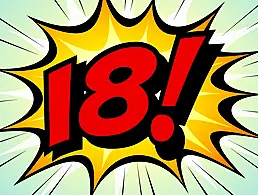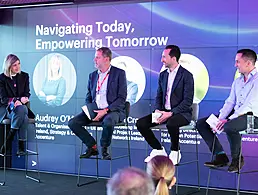Marguerite Sayers of ESB and Engineers Ireland wants young people to know how diverse a career in the industry can be – from F1 race teams and energy distribution to pharma and construction.
Marguerite Sayers has been a member of the executive director team at ESB for the past five years, where she manages the company’s customer solutions in such businesses as Electric Ireland, ESB eCars, ESB Energy and ESB Smart Energy Services.
Between individual residences and large corporations, that adds up to about 1.7m customers across ESB’s global markets. But beyond her busy day job, Sayers is also the president of Engineers Ireland.
To mark Engineers Week 2020 and in advance of her participation in Engineers Ireland’s STEPS Girls’ Summit at the Explorium in Sandyford tomorrow (6 March), she told us about her career path – from considering becoming a teacher to the importance of listening to others.
‘For me, books are a poor substitute for listening to people and for direct experience’
– MARGEURITE SAYERS
Did you always want to work in engineering?
No, actually, I didn’t. I didn’t even know what an engineer did! When I was in school, maths and science were my favourite subjects. For a long time, I had thought about being a primary school teacher, but you had to sing a number of songs at the interview to be accepted to teacher training college, and I wanted to avoid that at all costs – I don’t think the world was ready for my unintentional harmonies.
When I went along to an information evening run by Engineers Ireland for female STEM students, it opened my eyes to a career in engineering. So, I left the teaching behind and opted to study electrical engineering in UCC.
Were there any major challenges that you faced along the way to becoming an engineer, and in particular because you are a woman?
I can’t think of any major challenges – the course wasn’t easy, but we got through it. And I can’t say that I have experienced any specific challenges at all because of being female – I had expected that there might be, but I cannot identify any bias or discrimination that I experienced during my career in ESB.
There is a bit of an additional workload that comes from promoting STEM careers to female students and engaging in various fora where being female in a male-dominated industry is discussed, and that invariably falls to females in a company – and it probably should not.
And I think we also may put pressure on ourselves to some extent to work a little harder to ‘not let the side down’, but I think that is changing and is maybe a generalisation in any event.
Have there been improvements in the sector in terms of gender equality, do you think?
The progress hasn’t been as fast as I would have hoped. I think we are seeing some green shoots now – there have been increases in the number of female students studying higher level STEM subjects and it’s not far off 50/50. The gender balance in the discipline of chemical and process engineering is also quite good.
However, overall, the proportion of female graduates from all engineering courses is remaining stubbornly low, at about 13pc. On the plus side, I gather that a significant proportion of engineering students in first year in UCD this year are female, and I have attended a number of presentations with TY female students recently.
Once they hear from qualified engineers about their positive career experiences, the feedback is really positive and greatly increased numbers indicate that they will also seriously consider STEM careers.
Was there any one role model you had that impacted your decision to become an engineer?
My dad always encouraged me from a very young age in terms of maths and science, which definitely prepared me for a career in engineering – though I didn’t know at the time that that was where I would end up.
I should really give the main credit to the female graduate engineers that volunteered to come to speak to our class about engineering when I was in fifth year – and to Engineers Ireland for organising the event – as they really prompted me to make the career decision, but I’m afraid I don’t know their names.
As a result, I really enjoy speaking to second-level students about STEM careers as I have personal experience of the benefit of those engagements.
Not all attendees will opt for engineering or STEM by any means, but it is really important that the students have the full menu of options and have accessible role models before they make their choices.
What’s your favourite thing about your job?
The variety in my job is great – both on a day-to-day basis and [in] the various paths that you can pursue using an engineering qualification as a base. It’s never boring.
I know engineers that work in financial roles, in HR, in research, in sales, in technical advisory roles and in management, and that work in diverse industries from F1 race teams and pharmaceutical developments to energy distribution and construction. And you can move between various roles – sometimes industries – as you progress through your career.
The mix of indoor and outdoor work, and the opportunity to work with large numbers of people, is something that I really enjoy. It is also a great time to be part of the energy transition in moving towards a low-carbon economy, which is so important for all of our futures.
Following a motion at Engineers Ireland Council, Marguerite Sayers, Engineers Ireland President, declared a Climate and Biodiversity Emergency at today's Engineering 2020 report launch on World Engineering Day for Sustainable Development at Clyde Road. #WorldEngineeringDay pic.twitter.com/jffDZIQaEI
— Engineers Ireland (@EngineerIreland) March 4, 2020
Are there any trends you foresee impacting your industry, now and in the future?
The huge issue for the energy industry right now is the need to address climate change by transitioning to low-carbon technologies as mentioned above, which makes it a very interesting and exciting place to work at the moment.
There is also a huge trend towards digitalisation – including an increasing portion of customer communications. In future, I think we are also going to see more and more local community-based generation and micro-generation, and customers will want more autonomy and control over their energy production and also their data.
However, it is important that we do not leave people behind, and the traditional ‘system’ is very important in maintaining both the reliability of energy supply and also a fair distribution of costs.
If you could tell your younger self one thing, what would it be?
Not to have a fixed idea of what your career path will be and be open to opportunities.
And to ask lots of questions during the first six months of any new role – it’s the best opportunity to learn. Yes, I know – that’s two things!
Are there any resources that you draw on, either for your work in Engineers Ireland or ESB?
I suspect you are not looking for an answer that involves Lee Child! Everybody is different, but I have never relied much on business or management books or podcasts. I have started a few but never got to the end.
I tend to listen to advice from the people I meet both in my own company and in the industry and then to think things through, to try and see things from others’ points of view and just to use common sense.
For me, books are a poor substitute for listening to people and for direct experience. I do enjoy the odd TED talk, though.




